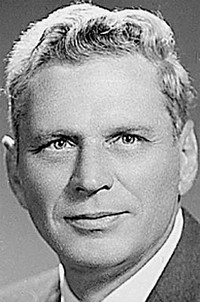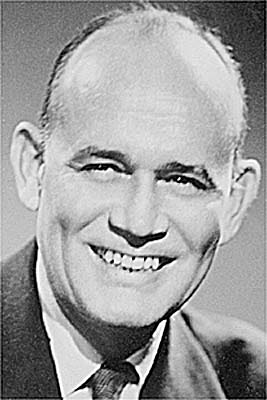<Back to Index>
- Psychiatrist Corbett H. Thigpen, 1919
- Psychiatrist Hervey Milton Cleckley, 1903
PAGE SPONSOR

Corbett H. Thigpen (January 8, 1919 – March 19, 1999) was an American psychiatrist and co-author of the internationally popular, nonfictional book The Three Faces of Eve (1957).
Born in Macon, Georgia, Thigpen helped his family live through the Great Depression by turning his interest in amateur magic to professional account at age 14, making presentations to local civic clubs. His lifelong involvement in this hobby resulted in his being inducted into the Hall of Fame of the Southeastern Association of Magicians. By contrast he considered among his highest achievements his earning of the Eagle Scout Award of the Boy Scouts of America and supported that group throughout his life.
Educationally, having attended North Georgia State College and University, in 1971 Dr. Thigpen served as President of its Alumni Association and was named Outstanding Alumnus in 1971 – 72 after helping lead a successful fight in the Georgia General Assembly to maintain the military character of the school. Further, being a 1942 graduate of Mercer University in Macon, in 1997 he was named a Distinguished Alumnus of that school. He graduated from the Medical College of Georgia (MCG) in Augusta in 1945, having served in the U.S. Army during World War II, and continued to serve, but as a Captain and physician, until mustering out in 1948.
Dr. Thigpen then entered into the private practice of psychiatry with Dr. Hervey M. Cleckley, a brilliant and highly accomplished physician. Together, for much of the 1940s and most of the 1950s, they comprised the Departments of Psychiatry and Neurology at MCG, being then and there the only teachers in those fields, while also maintaining their private practice. Dr. Thigpen rose to the status of Clinical Professor of Psychiatry at MCG. A former medical student and Augusta doctor has remarked that in his academic career Dr. Thigpen's class was the only one in which the professor received a standing ovation after every lecture. He was also known internationally for his research, publishing more than 40 professional papers.
In 1957, with Dr. Cleckley, he co-authored the book The Three Faces of Eve, the first popularized account of a case of what is now known as Dissociative Identity Disorder. Further, this case was apparently the first instance of a such a patient's demonstrating more than two personalities. The book was made into a film, released later that year and starring Joanne Woodward, who earned an Academy Award for Best Actress for her role. At the authors' behest the film strictly and without exaggeration followed the actual patient's life and treatment. Documentation exists that the patient and all pertinent members of her family received compensation for their permissions to publish their stories. Dr. Thigpen ended his life on good terms with the patient.
During the mid 1960s Dr. Thigpen actively stated his opposition to the policy direction of the Vietnam War, believing that it was not being fought to win, and vehemently disagreed with increasing the role of government in citizens' lives, particularly in the medical field, a trend he predicted would result in a decrease in the general quality of healthcare. To express these ideas, Thigpen wrote the speech "A Psychiatrist Looks At His Nation" and presented it approximately 150 times across Georgia and South Carolina over about a two year period. As a result, in 1968 he was awarded the Freedom Foundation's George Washington Medal. Further, he was named a member of the Distinguished Speakers of America. All these addresses were undertaken at his own expense and apparently devoid of political ambition. Specifically, the Georgia Republican Party asked that he consider running for governor and later for the U.S. Senate; he respectfully declined both, indicating that the times probably were not ripe.
Dr. Thigpen continued his practice of psychiatry until 1987, when vertigo forced retirement. In 1988 he was honored with proclamations of good citizenship by the Mayor of Augusta and the Governor of Georgia.

Hervey Milton Cleckley, M.D.(1903 - January 28, 1984) was an American psychiatrist and pioneer in the field of psychopathy. His book, The Mask of Sanity, originally published in 1941, provided the most influential clinical description of psychopathy in the twentieth century. The term "mask of sanity" derived from Cleckley's observations that, unlike people with major mental disorders, a psychopath can appear normal and even engaging even when suffering from hallucinations or delusions. The "mask", however, conceals a disorder.
Cleckley was born in Augusta, Georgia, and graduated from the Academy of Richmond County in 1921. He was graduated in 1924 summa cum laude with a Bachelor of Science degree from the University of Georgia (UGA) in Athens where he was a member of the varsity football and track and field teams. Cleckley won a Rhodes Scholarship and graduated from Oxford University with a Bachelor of Arts in 1926.
Cleckley then earned his M.D. from the University of Georgia Medical School (now known as the Medical College of Georgia) in Augusta in 1929 and was named professor of psychiatry and neurology at the Medical College of Georgia and the Chief of psychiatry and neurology at University Hospital in Augusta in 1937. In 1955, Cleckley was appointed clinical professor of psychiatry and neurology at the medical college and became founding chairman of the Department of Psychiatry and Health Behavior.
In 1941, Cleckley authored his magnum opus The Mask of Sanity: An Attempt to Clarify Some Issues About the So-Called Psychopathic Personality. This became a landmark in psychiatric studies and was repeatedly reprinted in subsequent editions, the most recent being in 2003. Cleckley revised and expanded the work with each edition published; the second American edition published in 1950 underwent significant revision.
The Mask of Sanity is distinguished by its central thesis, that the psychopath exhibits normal function according to standard psychiatric criteria, yet privately engages in destructive behavior. The book was intended to assist with detection and diagnosis of the elusive psychopath for purposes of palliation and offered no cure for the condition itself. The idea of a master deceiver secretly possessed of no moral or ethical restraints, yet behaving in public with excellent function, electrified American society and led to heightened interest in both psychological introspection and the detection of hidden psychopaths in society at large, leading to a refinement of the word itself into what was perceived to be a less stigmatizing term, "sociopath".
Robert D. Hare devised the "Psychopathy Checklist (PCL)" to assess the main characteristics of psychopathic behavior, based in part on Cleckley's work.
In 1956, Cleckley co-authored The Three Faces of Eve with Corbett H. Thigpen, which served as the basis for a 1957 film starring Joanne Woodward about Multiple Personality Disorder.
Other notable professional distinctions of Cleckley include Fellow of the American Board of Psychiatry and Neurology and psychiatrist in the trial of Ted Bundy. Cleckley also authored The Caricature of Love: A Discussion of Social, Psychiatric, and Literary Manifestations of Pathologic Sexuality.